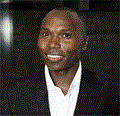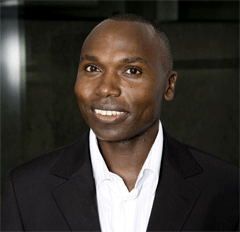Kipketer calls for fairer procedures in IOC Athletes' Commission

04.09.2008
By Stine Alvad |
|
Wilson Kipketer. Photo courtesy of D |
Former Olympic medallist Wilson Kipketer calls for changes to voting procedures for election to the IOC Athletes' Commission. An election he feels has been subject to inappropriate and unfair procedures.
The election, which took place three days before the end of the Beijing Games, listed 29 candidates for four vacant seats on the commission.
South Korean Dae Sung Moon, was with his 3220 votes, the candidate with the highest number of votes. Also elected were Russian swimmer Alexander Popov, German fencer Claudia Bokel and Cuban volley-baller Yumilka Ruís Luaces.
Kipketer, who represented Denmark in the 800m in the 2000 and 2004 Olympics, just missed out, coming sixth overall. While the Dane does not dispute the result, he believes certain procedural changes would result in a better environment for election campaigning.
Hard to lobby
As present rules stand, the election campaign runs for just two weeks before the actual election and is subject to a list of procedures making it difficult for some of the candidates to lead an active and effective campaign.
Kipketer complains that the candidates for the Commission are not given the possibility to move freely in the Olympic Village but have to buy tickets to get in touch with the athletes of the different sports at the Olympics. Some competitions also take place far away from the Olympic Village, which makes it difficult for competitors in those locations to lobby the majority of the athletes who live in the Olympic Village.
“It would be a great help if IOC allowed us to move freely in the Olympic village and in the different arenas and stadiums”, Kipketer told the Ritzau news agency.
Online debate
Pedro Yang, a Guatemalan badminton player who finished fourteenth in the elections, proposes that the athletes could start off the campaign before the Olympics through a website or online debate. “A debate like that could show the athletes who really has something to say,” Yang told Ritzau.
Currently, candidates are restricted in their ways of presenting themselves to the voters. The campaign can only take place during the Olympic Games and each candidate’s campaign material must consist only of a black and white A4 flyer presenting his or her top-priorities in the work of the commission.
Hard for smaller nations
While the election procedures affect all nations, both Yang and Kipketer believe that candidates from smaller nations are at a significant disadvantage during the election process.
Some big countries like the U.S. and Canada have on-going alliances and therefore many potential voters amongst the athletes, believe Yang and Kipketer. “Canada and the US have a close collaboration, so I know for a fact that they are all going to vote for the American candidate [footballer, Julie Foudy] without her having to state her viewpoints,” Yang told the Ritzau news agency.
The voters consist of the more than 10.000 athletes from 204 countries and every voting athlete has to place four votes on four different countries and four different sports to ensure a broad representation in the commission. But great nations like the US and China have 596 and 639 atheletes, which give them a great saying in the outcome of the election, as opposed to small nations like Denmark, that has 84 potential voting athletes.
To overcome this obstacle, Kipketer, Guatemalan badminton player Pedro Yang and German fencer Claudia Bokel formed their own alliance in order to obtain enough votes for a seat in the commission. A tactic that seems to have been successful since Bokel was elected. Kipketer himself was only 115 votes from a seat in the Commission, while Yang came in fourteenth.
Improper practices
Procedural obstacles were not the only cause for concern for candidates at the election, after reports that American athletes were offered gift vouchers worth USD 50 in exchange for picking up voting papers. This kind of financial incentive is against the regulations of the election as it could potentially influence voting turnout and provide unfair support to a particular candidate, in this case the American athlete.
The chairman of the election committee, Anita Defranz, confirmed these rumours, and the Americans have afterwards given the election committee a written apology and have now received a reprimand. The American candidate, Foudy, in the end missed out, coming in seventh.
Review necessary
Danish IOC member, Kai Holm, recognises that a review of the election procedures is necessary and according to Holm, changes are on their way. “It can not be done this year in Beijing”, he says to Ritzau, “but I wouldn’t be surprised if there was to be a proposition for change soon. An appropriate time would be the IOC session in Copenhagen 2009”.
The candidates, not chosen in Beijing will have another opportunity to take a seat in the commission, when IOC chairman Jacques Rogge later will choose another seven members to ensure a fair division between genders, nationalities and sports.
The purpose of the IOC Athletes' Commission is to ensure that the athletes themselves have a saying in the games. Delegates of the Commission take part in all organizational activities and further more establishes workgroups on different subjects like doping, women in sport and environment.
Related links:





